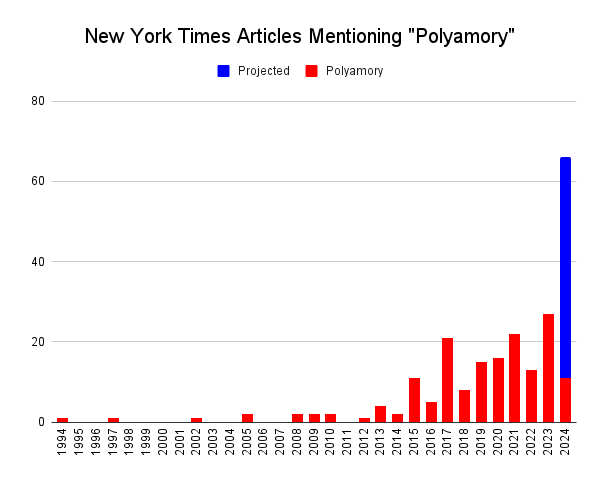
February 28, 2024

Source: Bigstock
I’m not much in the business of making predictions about the future, because it’s hard enough to understand what’s happening in the present. I don’t forecast the next big thing so much as try to notice the current thing. My goal is to be a historian of the present.
Back in May 2013, I discerned that The New York Times was promoting as the successor to gay marriage—as that triumphant campaign entered its shooting-the-wounded phase—transgenderism. This seemed bizarre at the time, but transgenderism indeed proved to be the New Current Thing, with catastrophic consequences for impressionable and moody young girls.
What’s next? Many on the right argued that it had to be pedophilia, mostly because that grossed them out the most. But all the trends point in the opposite direction: For example, the woke are increasingly disgusted by the thought of a 35-year-old man marrying a 25-year-old woman (presumably, a trend driven by all the single 35-year-old women fearing being permanently left on the shelf by single 35-year-old men).
What about polygamy? For years, I rejected that as too redolent of the Old Testament and 19th-century Mormonism to catch on.
And let’s face it: Polygamy is pretty impractical.
There are two general types of polygamy practiced in the Old World: serious and nominal. Persian Gulf Arabs take certainty of paternity highly seriously, so multiple wives are not allowed out of the house much to work in case they are tempted to dally with the men they meet on the job and saddle their husband with a bastard. This makes polygamy expensive for the provider, so it’s fairly rare in the Arab world.
Polygamy is much more common in sub-Saharan Africa precisely because it’s rather nominal. A rich, sexy landowner might collect a dozen or even 100 wives over a long life.
But are all the countless children really his? Unlike in Yemen where a harem is kept in purdah, each morning the African gerontocratic polygamist sends his wives out to work in his fields to grow food for their children. Might some of them, feeling neglected by their aging husband, rendezvous with lonely young bachelors in the bushes? Maybe, but, eh, it’s up to his wives to grow the food to feed their kids, so it’s no skin off his nose.
And, under the guise of the nonsexist, nontraditional neologism “polyamory,” groundwork has been laid since about 2015 for polyamorism to be the New Current Thing, with possibly a breakthrough going on in 2024.
The New York Times, for instance, first mentioned “polyamory” in a 1994 article about all the wacky nonsense you can look up on the newfangled internet:
Opening it three times at random, I found the Internet addresses for groups on cryonics (freezing the dead in the hope of eventual cures) and lock-picking, practical Christian life and polyamory, the practice of having many lovers.

For the next two decades, the Times ran about one article per year on polyamory. Then, from 2015, about one per month. Last year, there appeared a record 27 articles about polyamory, and 2024 is on pace for 66.
So, we appear to be approaching liftoff for polyamory as a Thing.
The great appeal of polyamory is you can define it to mean whatever you are into.
Are you a man who wants a harem? Go for it. That’s polyamory.
Are you a woman who enjoys domestic drama, who’d like two suitors fighting for your favors, like in those Mormon vampire Twilight movies? That’s polyamory too!
Are you a tech nerd born without the Jealousy Gene who has felt, ever since you read in ninth grade Robert A. Heinlein’s sci-fi cult novels Stranger in a Strange Land and The Moon Is a Harsh Mistress (with their lengthy descriptions of complex marriage arrangements), that it would be irrational to restrict yourself to just one woman in return for her restricting herself to just one man? Well, that’s not “wife-swapping” anymore, like they dismissively called it back in Heinlein’s day, that’s now “polyamory,” which sounds much more respectable.
Are you a person with a three-digit IQ who likes writing down rules and then rewriting them when they don’t work, who likes to tell yourself that you aren’t a slave to your sexual passions like all those underclass rednecks with their “random families”? You are instead an ethical polyamorist.
Are you pathetic and unappealing, and the best you figure you can do is to share a member of the opposite sex? The word “polyamorist” sure sounds better than “loser.”
Are you bisexual, nonbinary, questioning, sluttish, or just plain confused? Well, you can now describe yourself as having a polyamory identity, too.
(Note that, increasingly, exponents of polyamorism describe it not as their preference but as their identity, just as men who like to dress up in women’s clothes used to have a transvestite fetish, which made them figures of fun, but now have a transgender identity, which makes them sacred and entitled to abuse anybody lower on the pyramid of identity-politics privilege.)
Are you a chad from Chad who wants to import your Prophet-approved four wives (and you forget exactly how many of their kids) and get them all on welfare in Lewiston, Maine? Now you can get lumped in with all your fellow polyamorists too! Isn’t that thrilling?
Well…no. In fact, being grouped with the typical white American polyamorist sounds disgusting and demeaning to the average proud African Muslim polygamist.
Ironically, that could be the sticking point preventing the Age of Polyamory from quite taking off.
A couple of years ago, I predicted:
My guess is that some form of polygamy will instead be next, with computer nerds who lack the gene for sexual jealousy demanding “polyamory” and NGOs servicing African refugees insisting that Mr. Nguma and all four Ms. Ngumas and their nineteen children be let in because “love is love,” and if you don’t approve of polygamy you’re racist.
But, so far, the polyamorists—who tend to be extremely white, Scott Alexander-level white—have signally failed to make an alliance with their seeming natural allies, the masses of the Sahel.
But the future remains unwritten.